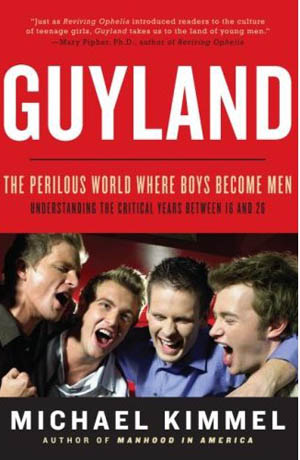The Ernst Common room has never been so steamy. Last Monday, in a room packed with students, faculty and staff, there were talks of female pleasure, hooking up, homoeroticism and the plights of growing up male. Michael Kimmel, Professor of Sociology at SUNY and author of Guyland: The Perilous World Where Boys Become Men, among other books, spoke to the crowd in one of the more enjoyable talks in recent memory.
Starting off, Kimmel touched on the phenomenon of “helicopter parenting,” something with which some in the audience were likely familiar. The author also spoke about the male tendency to lack the ability to commit, as well as a new stage of development between adolescence and adulthood, which many simply assumed was called “going to college.” Starting off, Kimmel touched on the phenomenon of “helicopter parenting,” something with which some in the audience were likely familiar. The author also spoke about the male tendency to lack the ability to commit, as well as a new stage of development between adolescence and adulthood, which many simply assumed was called “college.”
Kimmel moved forward, saying that the sexual revolution was more about a women’s entitlement to pleasure than an increase in men’s sexual list of to-do’s, outlining four essential rules by which all men who hope to keep their manhood must abide. Pay close attention. Firstly, no sissy stuff, as masculinity is inherently anti-feminine. If that means calling your friend a “fag,” a phenomenon Kimmel discussed using anecdotes about rapper Eminem, then it shall be done.
Being a “big wheel” is the second most important rule in manhood, as manhood can always be determined with who has the most toys or, as older gentlemen measure, the biggest salary. The third rule is being reliable in crisis. Lastly, giving them hell by taking risks is where it’s at these days. Do you remember that Old School scene at the frat house with the hazing and cinder blocks? Kimmel actually chronicled that happening at one fraternity during his field study. Some people will do anything to live off campus.In discussing hooking up, Kimmel illuminated that the amount of hanky-panky on campus isn’t as much as one might think. Due to Conn’s small size, the hookup culture has the tendency to feel a bit incestuous and really intrusive at times, like someone wearing your shower shoes. Yet, Kimmel’s research demonstrated that just because we’re a small institution doesn’t mean we’re all that different from many other colleges or universities. Kimmel reported that roughly 25% of people on a college campus have hooked up at least seven to eight times, whereas 25% of people on a college campus have never hooked up. Think the numbers are much higher here? You might want to consider that again, as the number of people who had sex this past weekend is probably lower than you’d imagine.
Kimmel’s conversation on deliberately vague, drunken, often one-sided hookups made many think about our own experience or the experiences of others we’ve eagerly discussed on Sunday mornings in Harris. In Guyland, Kimmel asked a group of women if they had had an orgasm during their last hookup. Of that group, 40% answered that they had. The same question was posed to a group of men, and of that group, 70% answered in the affirmative. Yet, when asked if their female partners had achieved an orgasm, men answered that 80% of their partners had indeed had an orgasm. What does this mean? It means that some ladies have an inherent acting talent, a big heart or no time. It also means that young people are not speaking to each other the way we need to, a point Kimmel emphasized time and time again.
Kimmel occasionally relied on stereotypes, something not expected of a championed sociologist. One example was Kimmel’s implication that if a fraternity initiation process, witnessed by Kimmel during his Guyland field studies, was to be viewed by a Martian visitor, said extraterrestrial would believe that all human men were homosexual. This one quip suggested that all gay men go around grabbing each others’ crotches, lending itself to the homosexual-promiscuity concept a bit too well. And although his work in Guyland mainly dealt with the socialization of heterosexual men, his talk to a diverse crowd at a former women’s college included no non-heteronormative examples, especially in terms of sex and relationships.
That aside, Michael Kimmel’s lecture was a refreshing discussion of student’s time and actions in college, especially regarding the range of emotions and expectations (sexual and otherwise). Kimmel mentioned that he wrote Guyland, “not to be critical of young men, but to be compassionate of them.” As it stands, Guyland should be required reading by everyone, male and female, before entering college. If not to help some understand the difficulty and expectations of growing up male, then perhaps to encourage those males to change and break out of the mold. College is a time for learning and exploration, but neither of those can be achieved if one has no idea why they are the way they are. Both Guyland and Kimmel are hoping to change that. •











